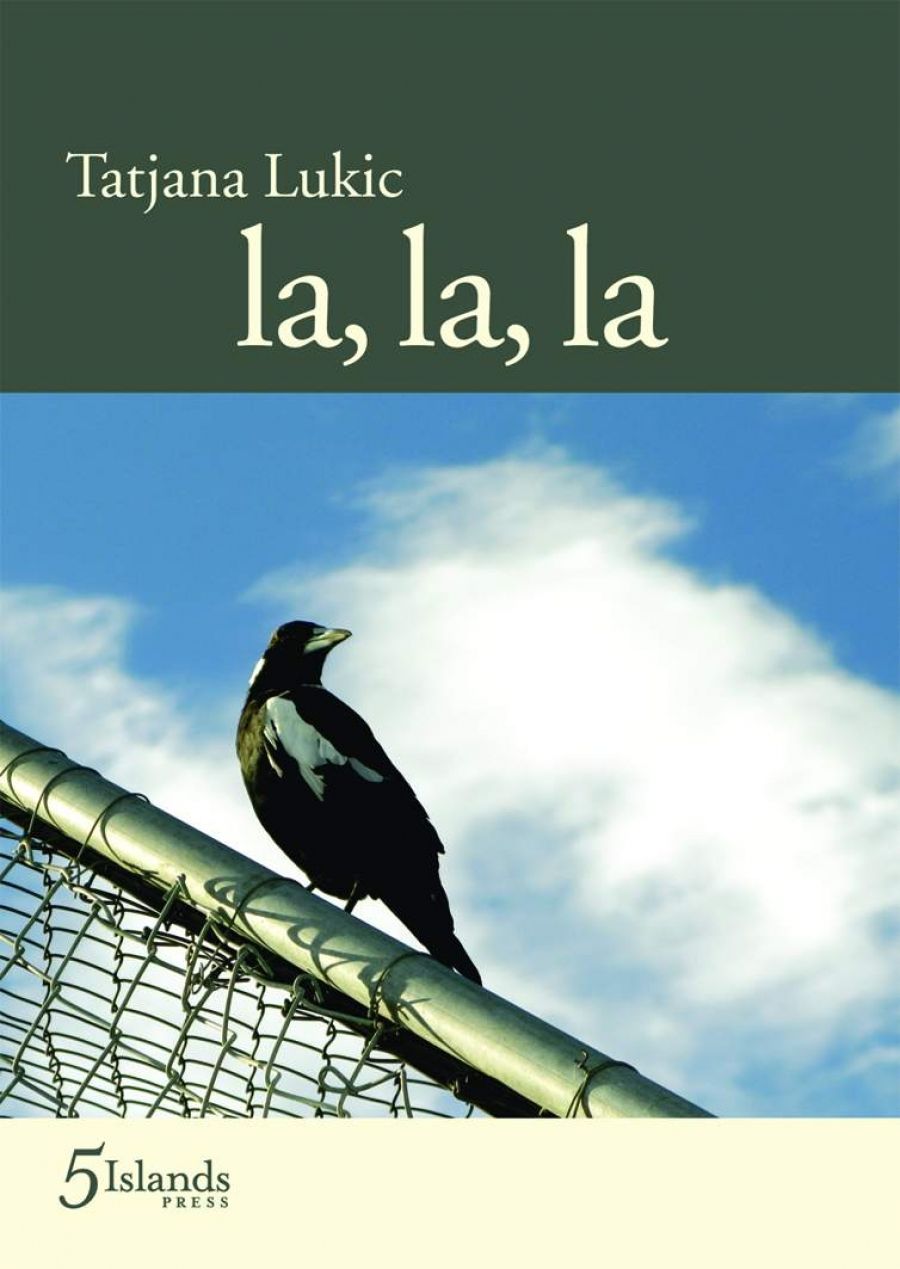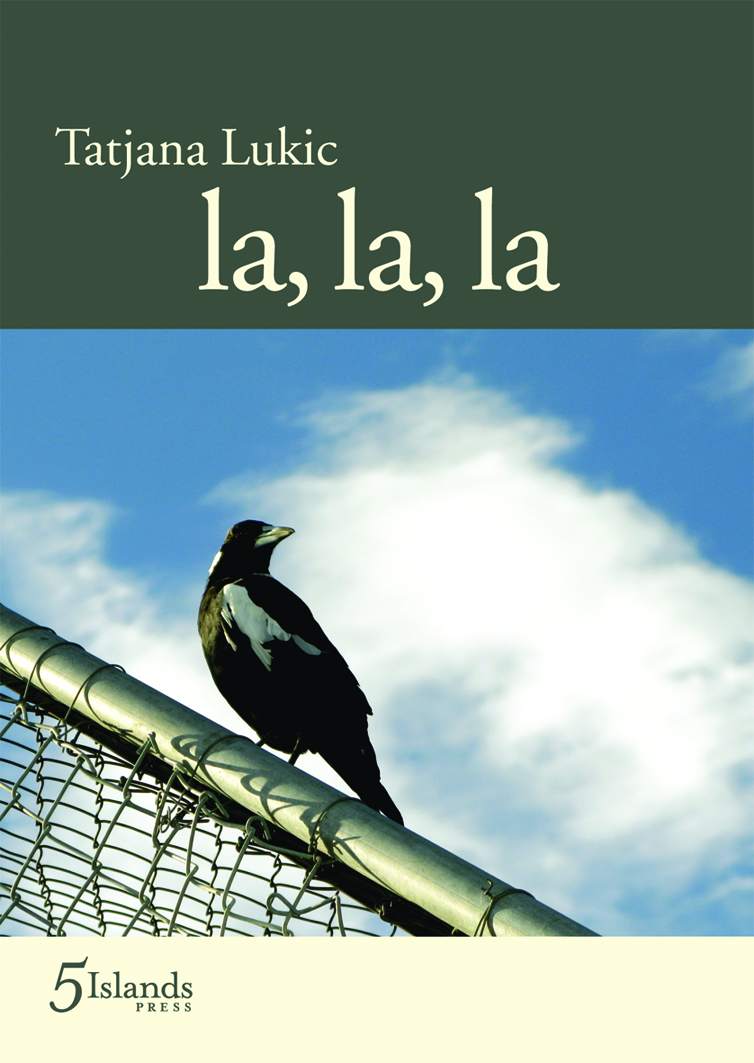
- Free Article: No
- Contents Category: Poetry
- Review Article: Yes
- Article Title: Straight road of melancholy
- Online Only: No
- Custom Highlight Text:
The first thing that struck me on picking up Tatjana Lukic’s posthumous collection, la, la, la, is the impressive appearance of this Five Islands Press publication. High-quality production hasn’t always been a feature of this press, but it is now under the new publishing team. Lukic’s volume joins other attractive collections by poets such as Louise Oxley, Barry Hill and Judy Johnson.
- Book 1 Title: la, la, la
- Book 1 Biblio: Five Islands Press, $19.95 pb, 78 pp
- Book 1 Cover Small (400 x 600):

- Book 1 Cover (800 x 1200):

While remaining aware of the wide stretch of history, Lukic always focuses her view on the human, notwithstanding the violence of Croatia’s secession from Yugoslavia. She attends bluntly but with considerable warmth to family, friendship and community. In ‘nothing else’, she establishes her context: ‘yes, someone dear to me was hit there’; ‘no, I did not starve / yes, I sold a wedding ring and bought bread and milk’. This directness implies a confidence of sorts in Lukic’s English voice; it is not without nuance and recognition of the value of silence: ‘la la la, / yes, nothing else.’ This ‘yes’ establishes an interesting, enabling contradiction where silence or extinction are not absences, but vivid presences.
This disorientation resurfaces in ‘an outlier’, where the speaker’s friend, Sinan, busy translating Ovid, is seen as ‘making trouble for those busy with / matters of consequence’ and so ‘has to be deleted’. Eventually he is, whether literally or figuratively – ‘sinking down / into a dark of the crammed recycling bin’. That it is ‘the crammed recycling bin’, rather than ‘a’, gives the poem’s close a shudder of brutality that removes doubt.
The Yugoslav civil wars don’t define Lukic’s view of history and culture, though they play a prominent role in her writing about her homeland. In ‘1959’ she revels in a simple and direct image that merges the natural and maternal: ‘blossom was all over bosnia when mum stepped onto the balcony / and took a deep breath.’ Just the same, there is a foretaste here of the poet’s subsequent national and linguistic exile: ‘but across the borders / a silence was swelling hard again / from Budapest to the grandparents’ home / just a straight road of melancholy.’
The ‘straight road of melancholy’ leads to Australia, where the book loosens up a little and its focus wanders. This may be a function of writing in a second language, a daunting business. Lukic seems to have gravitated towards the flatter elements of the mythic laconic national voice. This comes across in a casualness that does not always seem intended. Certainly, when she slips self-consciously into these rhythms and tones, Lukic’s sure-footed voice from the poems in the book’s first section, ‘there’, begins to fail her. The dislocation she writes of transforms into a brittle awkwardness that unbalances the poems’ staggering poise. That she doesn’t always effectively capture the rhythms of English – rendering them in a slightly shy tone – detracts substantially from poems that veer towards being otherwise convincing.
Lukic’s distance from home intensifies her dislocation. Croatia becomes a ‘bad penny’, its ‘alphabet is stiff as a birthmark’. She also wrestles with a more personal dislocation amplified by technology in the otherwise open intimacy in ‘east row, mort st, canberra’. The connection and intimacy of the poem also opens up – in fact, is interdependent with – a fear of technology-enabled disconnection: ‘‘it’s snowing, darling, open the window!’ / recorded all answering machines / across the lake.’
If Lukic’s poems feel underworked, it nonetheless pays to attend to what might be the most vital question she asks, and which accounts for her attention to seemingly uninteresting details, or her interest in quotidian details and events: ‘is this important?’. If this voices an uneasy irony, it only further reinforces the curious, questioning tone of much of Lukic’s work. This is doubled as the immigrant Lukic questions established Australians’ notions of national identity: ‘it does not matter what is coming / out of my mouth, where are you from? / where are you from? is what comes in reply’.
Lukic takes some considerable risks. In ‘thinking in months’, spiked with her battle with cancer, she topples into bleak devastation: ‘I had enough I thought, / I really had enough, that was it, maybe some gods heard me? / and they took it for real? ... / … gosh! I was only joking.’ The gruelling flatness of this passage typifies much of the book in its occasional overreaching of voice, and its dreadful honesty. If la, la, la is Lukic’s testament, it is a raw, querying and often rewarding one.


Comments powered by CComment